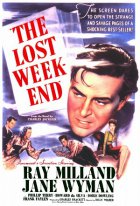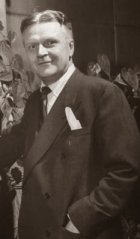
The Lost Weekend Page #4
- NOT RATED
- Year:
- 1945
- 101 min
- 967 Views
Don stops. He'll have to pass them if he goes down the street
and he doesn't want to, not with these bottles peeking out
of that bag. He turns back and approaches the grocery store
next door to Brophy's. In front of it is a fruit stand.
Screening his gesture from the ladies with his back, he picks
up three apples and puts them in the top of the bag, to
camouflage the bottles. He puts down a coin, then walks down
the street toward the ladies, flaunting a paper bag which is
obviously full of apples.
The lady with the dog sees him. Don removes his hat in a
courtly bow, very much at ease with the apples.
DON:
Good afternoon, Mrs. Deveridge.
MRS. DEVERIDGE
Hello, Mr. Birnam.
Don passes the ladies.
MRS. DEVERIDGE
(Confidentially, to
her companion)
That's that nice young man that
drinks.
The other lady tsk-tsks. They both look after Don.
Don is about ten feet beyond them. Perhaps he has overheard
the remark. In any case, he is looking back. His look meets
theirs. Embarrassed, they turn. Mrs. Deveridge jerks on the
leash.
MRS. DEVERIDGE
Come on, Sophie. Let's go.
They walk down the street in the opposite direction from
Don.
A-24 DON
He looks after them. He is just in front of NAT'S BAR. He
steps hurriedly into the bar.
A-25 INT. NAT'S BAR
A typical dingy Third Avenue bar. The sun slants dustily
into the walnut-brown room. There is a long bar with a mirror
behind it, some marble-topped tables and bentwood chairs.
The woodwork, the furniture, the plaster of the place have
absorbed and give forth a sour breath of hard liquor, a stale
smell of flat beer.
As Don enters with the two bottles and the apples, there are
three people in the bar. Nat, the bartender, a broad-
shouldered, no-nonsense type of guy, squeezing lemons in
preparation for the evening trade; and, sitting at a table
in the corner, a girl named GLORIA, with an out-of-towner
who hasn't bothered to take off his hat. He's about fifty
and the manager of a hardware store in Elizabeth, New Jersey.
Gloria is a shopworn twenty-three. She's brunette, wears net
stockings and a small patent leather hat, and is a little
below the standards of the St. Moritz lobby trade.
Don crosses to the bar.
DON:
And how is my very good friend Nat
today?
NAT:
(On guard)
Yes, Mr. Birnam.
Don sits on a bar stool, putting down the paper bag.
DON:
This being an especially fine
afternoon, I have decided to ask for
your hand in marriage.
NAT:
(Wiping his hands)
Look, Mr. Birnam --
DON:
If that is your attitude, Nat, I
shall have to drown my sorrows in a
jigger of rye. Just one, that's all.
NAT:
Can't be done, Mr. Birnam.
DON:
Can't? Let me guess why. My brother
was here, undermining my financial
structure.
NAT:
I didn't tell him nothing about the
wrist watch you left here, or your
cuff links.
DON:
Thank you, Nat. Today, you'll be
glad to know, we can barter on a
cash basis.
He takes the bills and change from his pocket, puts it on
the bar.
NAT:
(Reaching for the
bottle and the jigger)
One straight rye.
DON:
That was the idea.
Nat pours the drink, then returns to squeezing lemons. Don
picks up the glass, is suddenly acutely aware of the people
at the table, of Nat's eyes. The glass freezes halfway to
his mouth. He puts it down and starts playing the nonchalant,
casual drinker -- the man who can take it or leave it. He
fingers the glass, turning it round and round. He takes a
pack of cigarettes from his pocket and shakes one out, lights
it. As he puts the match in the ashtray, his eyes fall on
that jigger of whiskey. It's hard to resist it any longer.
He takes a handkerchief from his pocket, wipes his forehead,
then his parched mouth. The time has come now. He puts the
handkerchief back in his pocket, lifts the glass and drains
it in one gulp. Actually, Don doesn't like the taste of
liquor, actively hates it indeed, as a one-legged man might
hate the sight of his crutches but need them in order to
walk.
Now that he has the drink in him, a kind of relieved grin
comes back to Don's face. He holds the empty jigger in his
hand. Nat has come up with the bar towel to wipe off the wet
ring left by the glass.
DON:
Don't wipe it away, Nat. Let me have
my little vicious circle. The circle
is the perfect geometric figure. No
end, no beginning... What time is
it?
NAT:
Quarter of four.
DON:
Good. That gives us the whole
afternoon together.
(He holds out his
glass for another
drink)
Only remind me when it's a quarter
of six. Very important. We're going
to the country for a weekend, my
brother and I.
From the table in the background comes Gloria, headed for
the powder room. Passing Don, she runs her finger through
the neckline of his hair.
GLORIA:
Hello, Mr. Birnam. Glad to have you
back with the organization.
DON:
Hello, Gloria.
She goes on. Don turns back to Nat.
DON:
Not just a Saturday-Sunday weekend.
A very long weekend. I wish I could
take you along, Nat. You --
(With a gesture towards
the liquor shelves)
and all that goes with you.
Without a change of expression, Nat pours the second drink.
DON:
Not that I'm cutting myself off from
civilization altogether.
He points at the bag with the apples showing. Nat looks, but
doesn't get it. Like a magician, Don takes two apples out,
revealing the necks of the bottles.
DON:
(Gulping down the
whiskey)
Now of course there arises the problem
of transportation into the country.
How to smuggle these two time bombs
past the royal guard. I shall tell
you how, Nat, because I'm so fond of
you. Only give me another drink.
Nat pours one.
DON:
I'm going to roll one bottle in a
copy of the Saturday Evening Post,
so my brother can discover it like
that.
(He snaps his fingers)
And I want him to discover it, because
that'll set his mind at rest. The
other bottle --
(Confidentially to
Nat)
Come here.
Nat leans over the bar towards --
DON:
That one I'm tucking into my dear
brother's suitcase. He'll transport
it himself, without knowing it, of
course. While he's greeting the care-
taker, I'll sneak it out and hide it
in a hollow of the old apple tree.
NAT:
Aw, Mr. Birnam, why don't you lay
off the stuff for a while.
DON:
I may never touch it while I'm there.
Not a drop. What you don't understand,
all of you, is that I've got to know
it's around. That I can have it if I
need it. I can't be cut off
completely. That's the devil. That's
what drives you crazy.
NAT:
Yeah. I know a lot of guys like that.
They take a bottle and put it on the
shelf. All they want is just to look
at it. They won't even carry a cork-
screw along, just to be sure. Only
all of a sudden they grab the bottle
and bite off the neck.
DON:
Nat, one more reproving word and I
shall consult our lawyer about a
divorce.
He points to the empty glass for Nat to fill it. Nat pours
another jigger.
Translation
Translate and read this script in other languages:
Select another language:
- - Select -
- 简体中文 (Chinese - Simplified)
- 繁體中文 (Chinese - Traditional)
- Español (Spanish)
- Esperanto (Esperanto)
- 日本語 (Japanese)
- Português (Portuguese)
- Deutsch (German)
- العربية (Arabic)
- Français (French)
- Русский (Russian)
- ಕನ್ನಡ (Kannada)
- 한국어 (Korean)
- עברית (Hebrew)
- Gaeilge (Irish)
- Українська (Ukrainian)
- اردو (Urdu)
- Magyar (Hungarian)
- मानक हिन्दी (Hindi)
- Indonesia (Indonesian)
- Italiano (Italian)
- தமிழ் (Tamil)
- Türkçe (Turkish)
- తెలుగు (Telugu)
- ภาษาไทย (Thai)
- Tiếng Việt (Vietnamese)
- Čeština (Czech)
- Polski (Polish)
- Bahasa Indonesia (Indonesian)
- Românește (Romanian)
- Nederlands (Dutch)
- Ελληνικά (Greek)
- Latinum (Latin)
- Svenska (Swedish)
- Dansk (Danish)
- Suomi (Finnish)
- فارسی (Persian)
- ייִדיש (Yiddish)
- հայերեն (Armenian)
- Norsk (Norwegian)
- English (English)
Citation
Use the citation below to add this screenplay to your bibliography:
Style:MLAChicagoAPA
"The Lost Weekend" Scripts.com. STANDS4 LLC, 2025. Web. 5 Feb. 2025. <https://www.scripts.com/script/the_lost_weekend_173>.







Discuss this script with the community:
Report Comment
We're doing our best to make sure our content is useful, accurate and safe.
If by any chance you spot an inappropriate comment while navigating through our website please use this form to let us know, and we'll take care of it shortly.
Attachment
You need to be logged in to favorite.
Log In